In the fourth edition of our Intuitive Eating series, we distinguish between the different types of food police, how to challenge them through intuitive eating, and ways to navigate negative self talk plus discuss intuitive eating and food waste.
If you missed our previous content on intuitive eating, be sure to get caught up on principles one, two, and three. This week, we are chatting all things “food police” aka the internal and external voices that influence our thoughts and beliefs around food and make us feel like complete crap about our food choices. We’ve all been there, enjoying our chocolate chip cookie or cheesy pizza, when before you know it that inner voice chimes in to trigger your feelings of guilt and shame. But the good news is, it doesn’t need to be this way! I am going to talk about how you can distinguish between the different types of food voices that you may encounter, how to challenge them, and even the positive “ally voices” that you should empower to help you find freedom with food. Ah yes, sweet sweet freedom from diet culture.
Before we dive into all things Food Police, I want to start by answering a reader question.
Intuitive Eating and Food Waste
How can I practice Intuitive Eating without feeling like I am wasting food?
Food waste is something we are all becoming a lot more mindful of because it’s not exactly great for the environment or our wallet. Part of the Intuitive eating approach is learning how to listen to your hunger cues, which means that sometimes you may or may not eat all the food on your plate. But that doesn’t necessarily mean that intuitive eating leads to more food waste. So here are my tips on how to honour your hunger while still cutting back on waste.
Tip #1: START SMALL
If your eyes are bigger than your stomach, start by putting smaller portions on your plate. No, this isn’t a rouse to help you eat less! This is to encourage you to eat one portion, reevaluate your hunger, and then get an extra serving if you feel like it. By using smaller portions and encouraging second or third or however many servings, you can honour your hunger while also controlling how much food ultimately ends up in the trash.
TIP #2: STOCK UP ON TUPPERWARE
My next tip is to get your Tupperware collection in tip top shape so you can pack up leftovers with ease and save for later. Storing leftovers not only helps keep things organized, but it minimizes food waste and makes meals more accessible. Its also a good idea to plan a few meals in advance every week so you know what your weekly meals will look like, which prevents more food from being purchase or cooked and ultimately wasted. Repurposing leftovers is also an option! For example, extra stir fried veggies can be piled into a taco, or any leftover protein can be chopped up and thrown on salad.
TIP#3: MAKE FRIENDS WITH YOUR FREEZER
Another tip is to utilize your freezer to store extra soups, casseroles, and other dishes so you can reuse them at a later date. I find this particularly helpful for baked goods like cookies of muffins because I cant comfortably eat a whole batch of cookies before they go bad, and I don’t want to talk myself into eating cookies if I am not in the mood for them just because I’m worried about wasting them.
TIP #4: GROCERY SHOP WITH A LIST not an empty stomach
Finally, a BIG tip is to avoid grocery shopping when you’re hungry and to prepare a grocery list. We make some rash decisions when we’re hungry and we can end up buying more food than we actually need, which increases the likelihood of it being wasted. As a result, we either try to eat all the food before it goes bad, even if we’re not hungry for it, or we end up throwing it out. By going in with a game plan and a satisfied stomach, you’re more likely to buy what you need and stay within your budget.
INTUITIVE EATING PRINCIPLE 4: CHALLENGING THE FOOD POLICE
Diet culture LOVES to fill us with guilt and anxiety around our food choices and theres even research to support this. Those who view food from a more neutral perspective do not experience any stress about eating and report greater self-esteem and self-efficacy. Whereas, those who tend to label foods like cake as “bad” or “junk food”, reportedly experience higher levels of guilt, stress, and lower levels of self-esteem. As a former dieter, I cannot emphasize enough that this is no way to live! What’s interesting is that food often comes attached with a heavy moral load. Think about it. How often have you heard food described as “temptingâ€, or “naughty.†We literally say certain foods tempt us as if eating them means we are committing some type of sin or crime. By avoiding the temptation, you are “good” but if you fall victim to the temptation you are inherently “bad”. This is diet culture talking.
Even if we don’t diet, per se, a lot of people still feel a resounding sense of guilt when they eat foods that are lower in nutritional value. As a dietitian, I am constantly critiqued over my food choices. People will see me enjoying a chocolate cake and I’ll hear something along the lines of “I’m surprised you’re eating that cake, it’s not good for you.†These comments may seem harmless, but they unnecessarily call a person out for having a balanced, healthy relationship with food. But every time I see or hear those comments, I’m constantly reminded that our society really does place foods on a hierarchical scale from bad to perfect. The problem is, by ridiculing and judging people’s food choices, they are taking part in this “good vs. bad†mentality around something as natural as eating. Sometimes, you just want to have some more potatoes without someone harping on you to have carrot sticks instead.
What’s interesting is that most people don’t realize that negative food talk is constantly around them. For example, some common “rules” around food that you may have heard before include – “don’t eat after 8pm”, “sugar is bad for you”, “don’t cook in oil”, “fat makes you fat” etc. etc. You get the gist! These food thoughts are known as “cognitive distortionsâ€, better known as the Food Police. But what exactly defines the Food Police? Are they all the bad? Let’s go through each type:
THE NEGATIVE FOOD POLICE VOICES
1. THE FOOD POLICE
You know when you’re enjoying your lunch and that inner voice chimes in to tell you whether or not you’re being “good†or “badâ€? Thats the Food Police. This voice can basically be defined as a sum of all of the negative diet thoughts and beliefs that you have built up throughout your life. These negative diet thoughts continue to grow as you are exposed to different types diet talk in the social environment. Say you’re casually strolling through the magazine aisle, the Food Police will be quick to pick up on the headline that reads “how to lose 10 lbs fast”, or be interested in your friends list of “forbidden foods” from her weight loss program. The voice of the Food Police may sound something like “If you over ate at lunch, just have salad for dinner”, “Don’t eat past 8, if you do, only raw veggies”, “Skip breakfast and just have black coffee”. Sound familiar?
2. THE NUTRITION INFORMANT
The Nutrition Informant keeps tabs on how nutritious your diet is and uses convenient cherry picked evidence on what is “healthy” and what is not. For example, it may tell you to avoid high-fat foods because “fat make you fatâ€, despite actual research saying the opposite. You know the Nutrition Informant is at work, for instance, when you choose a salad for dinner and feel hungry shortly after. You think “why am I hungry? I ate healthy.†This is because the Nutrition Informant told you that salads are healthy, making you neglect your actual hunger, when you may have wanted something more filling and substantial instead.
The thing about the Nutrition Informant is that it’s not always bad. The Nutrition Informant can have a wealth of knowledge that can be useful from a health perspective. However, we get into “diet culture” territory when the Nutrition Informant teams up with the Food Police by following the laws the Food Police set in place. Here is how to tell if the Nutrition Informant is working alone vs teaming up with the Food Police. Let’s say you’re choosing between two brands of yogurt. The Nutrition Informant may suggest plain, Greek yogurt because it’s higher in protein and lower in added sugars. This is a great & thoughtful suggestion based on health and NOT on deprivation! The key distinction is that you are being told to eat, but are evaluating for the most NUTRITIOUS option available. However, if the Food Police were to be involved in your decision making, the Nutrition Informant may have vilified yogurt all together for being an “unhealthy” dairy product, convincing you to choose a fruit cup instead. Leaving you hungry and deprived.
3. THE DIET REBEL
Last, but not least, we have the Diet Rebel. The Diet Rebel is the opposite of the Food Police and the Nutrition Informant, but has their own set of laws that are harmful. Think of the Diet Rebel as the other side of diet culture, where the Nutrition Informant and Food Police are diet culture supporters, and the Diet Rebel is, well, a rebel against it. Although fighting against diet culture is a good thing, the response the Diet Rebel takes can be harmful and a bit extreme. Instead of verbally confronting the negative food talk, the Diet Rebel will silently respond by going overboard with food. For example, in response to someone telling you to avoid eating cookies, the Diet Rebel might fight back by eating 10! If you feel like you’re a Diet Rebel, use your mouth for words to stand up for yourself when dealing with these people, instead of over-consuming food. You’d be surprised how powerful responding in a direct, yet polite way can be. For example, you could say “mom, I’m hungry and I want to have another slice of pizza. It’s really not a big deal†which may actually have your mom or someone else take a second to reflect on why they think another serving is a big deal. It’s polite but firm, which can help do the trick.
THE POSITIVE FOOD “ALLY” VOICES
1. THE FOOD ANTHROPOLOGIST
The Food Anthropologist is nice and neutral. They make observations but don’t judge. This voice lets you explore these observations without any guilt or shame. For example, it may observe “I ate 10 cookies today.†But that’s it. No judgement, no suggestions for improvement, just laying the facts on the table. Using a food journal can help you get to know the Food Anthropologist. Writing down your observations without judgement can actually help you identify different eating habits. Perhaps you noticed that every time you ate larger amounts of food, it was after work. That may actually give you some useful clues as to why you’re eating that way and if its actually serving the purpose you thought it was. Perhaps it’s a way to cope with stress or maybe you’ve been so busy all day, you didn’t eat enough for breakfast and lunch. By bringing out the Food Anthropologist, you can make these observations in a non-judgemental way while still collecting data.
2. THE NURTURER
The Nurturer is kind and gentle. This voice reassures you that everything is fine and you’re doing okay. For example, it may say “I feel my best when I take care of myself physically and mentally†or “It’s okay to have dessert. It’s normal to want dessertâ€. These kind, gentle messages help to remind you that enjoying food and being kind to yourself is the best way to feel and be your best self.
3. THE INTUITIVE EATER
The Intuitive Eater is a combination of the Food Anthropologist and the Nurturer. Everyone is born as an Intuitive Eater, but over time we lose our innate ability to eat intuitively because the Food Police, the Diet Rebel, and the Nutrition Informant are constantly nagging us. The Intuitive Eater ignores the calls of the negative food talkers and listens to the body’s natural signals. For example, it may say “Oh, my stomach is growling, I must be hungry†or it may say “I’m starting to feel full, I’m going to stop eating nowâ€. As you can see, it listens to the subtle signals of the body and respects them. It goes with the flow and honours the gut’s reactions, whether they are based on biology, personal needs and desires, or something else. Keep in mind that these voices come and go. Some days you’ll have positive thoughts, and other days you may have the Food Police in full force. As you go along your Intuitive Eating journey, you’ll slowly build skills to fight off the negative thoughts and focus on being the Intuitive Eater you were born to be. In some cases, working with a psychotherapist or a dietitian may help you navigate this journey and help you practice positive self-talk.
HOW TO CHALLENGE THE FOOD POLICE BY MANAGING SELF-TALK
What is Self-Talk?
Self-talk is the connection between diet culture and your eating behaviours. The Food Police laws that are set in place may come to your mind, but it’s your own personal self-talk that directs the behaviour you choose to follow. For example, a common diet law is that sugar is bad for you. If you have negative self talk, you may tell yourself “I can’t eat sugar, it’ll ruin my dietâ€. After a while of restricting, you might let yourself have some sugar, but because of your state of self talk, that sugar is accompanied by a ton of guilt and thoughts like “I have no willpowerâ€, “I’m weakâ€, etc. Soon, these thoughts turn into feelings. You start to feel upset, sad, disappointed, out of control and because you’re feeling bad, you can’t stop yourself and end up eating as much sugar as possible. And of course, the cycle continues. But if you were to challenge this diet law by saying “I can have sugar and live a healthy lifestyleâ€, you’ll be more likely to eat some sugar, enjoy it, and move on with your life. The idea here is that our thoughts or self-talk motivate our actions, which then motivate our feelings, which then motivate your thoughts, and so on. By taking charge of your self-talk, you can stop this vicious cycle from ultimately taking over your life.
HOW TO CHALLENGE THE FOOD POLICE BY MANAGING NEGATIVE SELF-TALK
Now, I realize that going from negative self-talk to positive self-talk doesn’t happen overnight. It takes a very long time to break free of this. But perception really is reality. If you are constantly experiencing negative self-talk, the reality is you’re going to have a negative relationship with food. In order to navigate this, ask yourself a few important questions: Are these thoughts ongoing? What am I saying to myself that makes me feel bad? Is anything actually true about these thoughts? Use your inner Food Anthropologist to make some neutral observations. An example of a negative, distorted thought would be: “I am so fat after eating ice creamâ€. Instead, a rational more positive thought would be: “I am lactose intolerant which can make me bloated. It’s temporary and I can take a lactose pill if I need to while still enjoying my treat.†By taking negative self-talk out of the equation, the scenario becomes much more relaxed and easy to solve, and by managing your patterns of thinking, you become even more in control of your eating. So, let’s talk about thinking patterns a little more.
DICHOTOMOUS THINKING
Dichotomous thinking compares “this vs that†or thinks in terms of absolutes. For example, you can’t have ANY cookies or you are going to eat ALL the cookies. This type of all-or-nothing approach immediately sets you up for failure because it expects perfection at all times. And as we know, no human is perfect. With dichotomous thinking, eating a cookie may make you feel that you’ve completely “failed†which sets you up for a cascade of guilt and bad feelings. This all-or-nothing mentality is impossible to keep up with and can really do damage to your self-worth and relationship with food. So how do you get out of dichotomous thinking? Instead of seeing life as black or white, try hanging out in the grey zone. Strip foods of their good and bad labels, and just see it as different options of various nutrient values and deliciousness. All foods, even ice cream, have redeeming qualities when you think like this, so theres just as much reason to sometimes choose ice cream as there is to choose broccoli or kale.
ABSOLUTIST THINKING
This type of thinking is similar to dichotomous thinking but it puts a lot of pressure on results. For example, this type of thinker may tell themselves they must eat perfectly for the next month so that they look “perfect†for their trip to Miami because if they don’t, they’ll feel really bad about that. As a result, this type of thinker frantically tries to eat perfectly without even exploring what that actually means. This can lead to following strict diets, cleanses, or weight loss programs that promote temporary quick fixes. What they fail to realize is, this type of behaviour already has them feeling anxious and awful, even if they do meet their “goalâ€. To stop absolutist thinking, you can start to use words such as “canâ€, “it’s okayâ€, and “may†to help you give yourself permission to live a life free of food guilt. For example: “It’s okay if I don’t lose weight before my trip, I know I’ll have a lot of fun!”, “If I’m hungry, I can eat what I really want”, “I may have the types of foods I feel like having”.
CATASTROPHIC THINKING
This type of thinking is filled with over exaggeration. It forces yourself to feel terrible and as a result, you behave in ways to compensate for these feelings. For example, saying “I’ll never lose weight and I’ll always be fat†only leads to negative feelings. And really, you’re setting yourself up for feeling bad about yourself. In this type of thinking, your happiness is reliant on accomplishing only the extremes of eating and body size. When in reality, your value has nothing to do with the body you’er in. To get out of this, try to focus on positivity. It takes a lot of practice, but you’ll get there. Make statements that aren’t designed to immediately have you feeling like crap. For example, tell yourself “I may not be society’s version of thin, but I can live a lifestyle that makes me strong, energetic, and feeling my best.†As a result, you’re more likely to engage in positive behaviours such as eating more fruits and vegetables, exercising, getting more sleep, etc.
PESSIMISTIC THINKING
If you’re the “cup is half empty†type of person, it’s time to fill that cup up. Life isn’t so fun when you see everything as terrible. And no, life isn’t all rainbows and sunshine, but it’s not all thunderstorms and hurricanes either. This type of thinking breeds negativity and, as a result, you behave negatively. The first thing to do is literally tell yourself “I’m not a pessimist†and continue to tell yourself that every day. Try to reframe your thoughts into positive ones even if at first you don’t totally believe it. For example, instead of saying “I’m such a failure†you can say “progress takes time, and I’m getting thereâ€. And sure, sometimes you have to fake it till you make it! It’s like research suggests, forcing yourself to smile can sometimes make you feel happy. I have used this technique for my anxiety, and it does work. In my experience, overtime those thoughts become second nature and far more genuine.
LINEAR THINKING
Finally, there’s linear thinking. This type of thinking is goes from A to B. For example, “by eating healthy and exercising, I will lose 10 pounds this month no matter whatâ€. However, it doesn’t consider other outcomes such as better mood, more energy, increased strength, less hunger, etc. For people with this type of thinking, it’s all about the destination and not about the journey to get there. But by taking a second to appreciate the view, you may notice a much larger transformation than you could have imagined. To get out of this, switch to process thinking which is defined as “focusing on continual change and learning, rather than just the end resultâ€. Start focusing on what you accomplish and learn along the way and accept that your end goal may look a little different than what you planned. For example, you may start noticing that you’re listening to your hunger cues, which is a massive accomplishment, instead of just focusing on what and how much you ate today. You’ll find that this helps to free up SO MUCH mental space for life.
YOUR INTUITIVE EATING HOMEWORK TO CHALLENGE THE FOOD POLICE THIS WEEK
This week I want you to focus on identifying each of the food voices around you in different settings and scenarios. Does the Food Police show up when you’re with your girlfriends, but you are more likely to access the nurturer when you’re with your family? To do this, write your food thoughts in a journal each time you eat or want to eat.
- What thoughts are going through your mind?
- Are you concerned with disobeying a diet law?
- Are you worried that something isn’t “healthy�
Write this down whether it’s positive or negative. Once you’re able to identify the food voices in your mind, you can begin to dispel the messages they’re sending. For example, if you’re worried about eating after 8:00pm, ask yourself direct, non-judgemental questions:
- Who says I can’t do this?
- Am I hungry?
- Will eating this food satisfy me?
By welcoming the Food Anthropologist, you can begin to navigate these thoughts without feelings of judgement. Over time, you’ll become better and better at this and the voices of the Food Police will lose their power. Diet culture has been around your entire life, so getting rid of these messages will not happen over night. Be kind to yourself through this process and know that it will take time.
Become an Abbey’s Kitchen Subscriber
Contribution by:
Katey Davidson, RD Taste of Nutrition
Edited by Giselle Segovia RD, MHSc
Updated on October 23rd, 2020

Abbey Sharp is a Registered Dietitian (RD), regulated by the Ontario College of Dietitians. She is a mom, YouTuber, Blogger, award winning cookbook author, media coach specializing in food and nutrition influencers, and a frequent contributor to national publications like Healthline and on national broadcast TV shows.
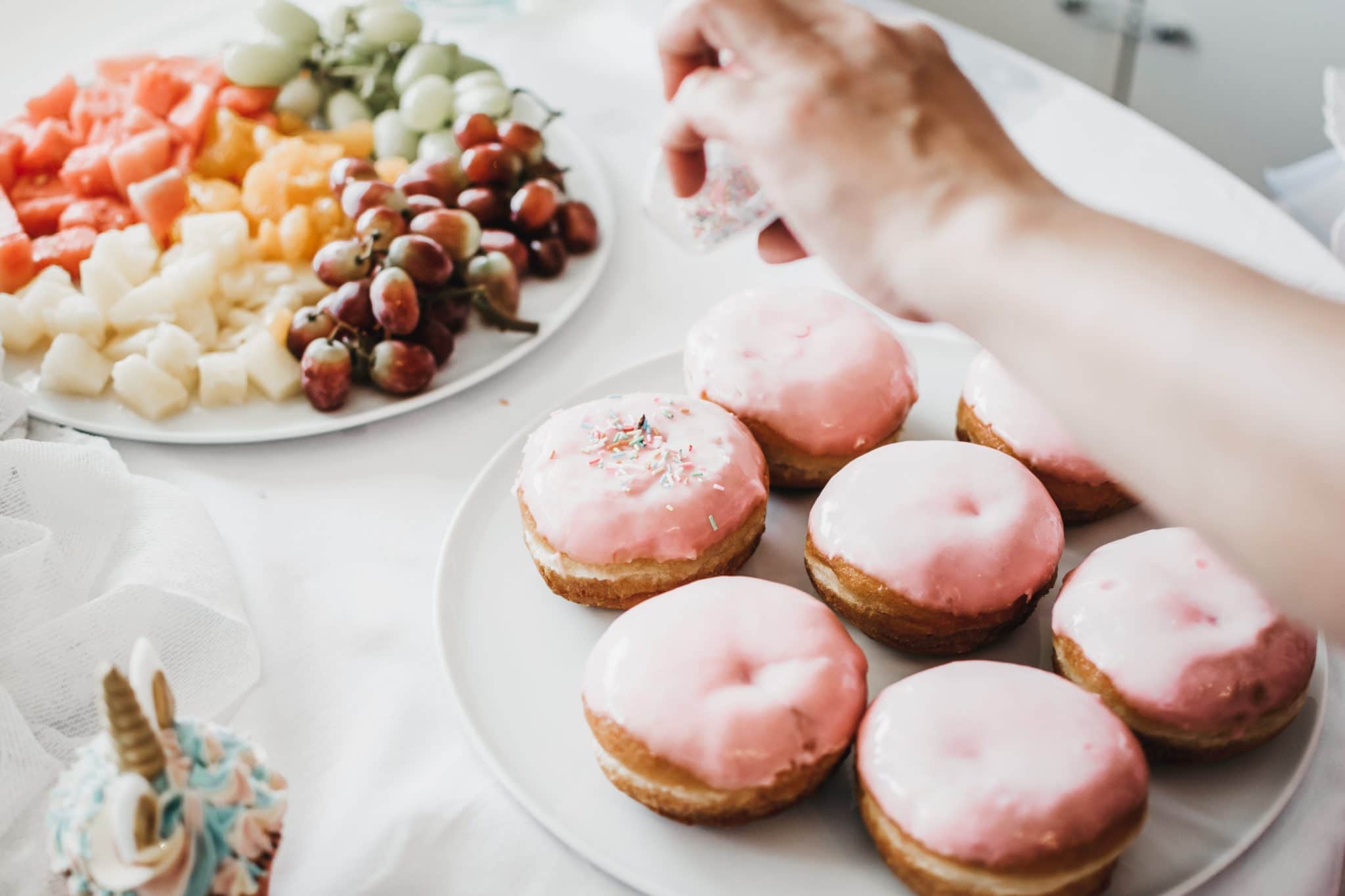
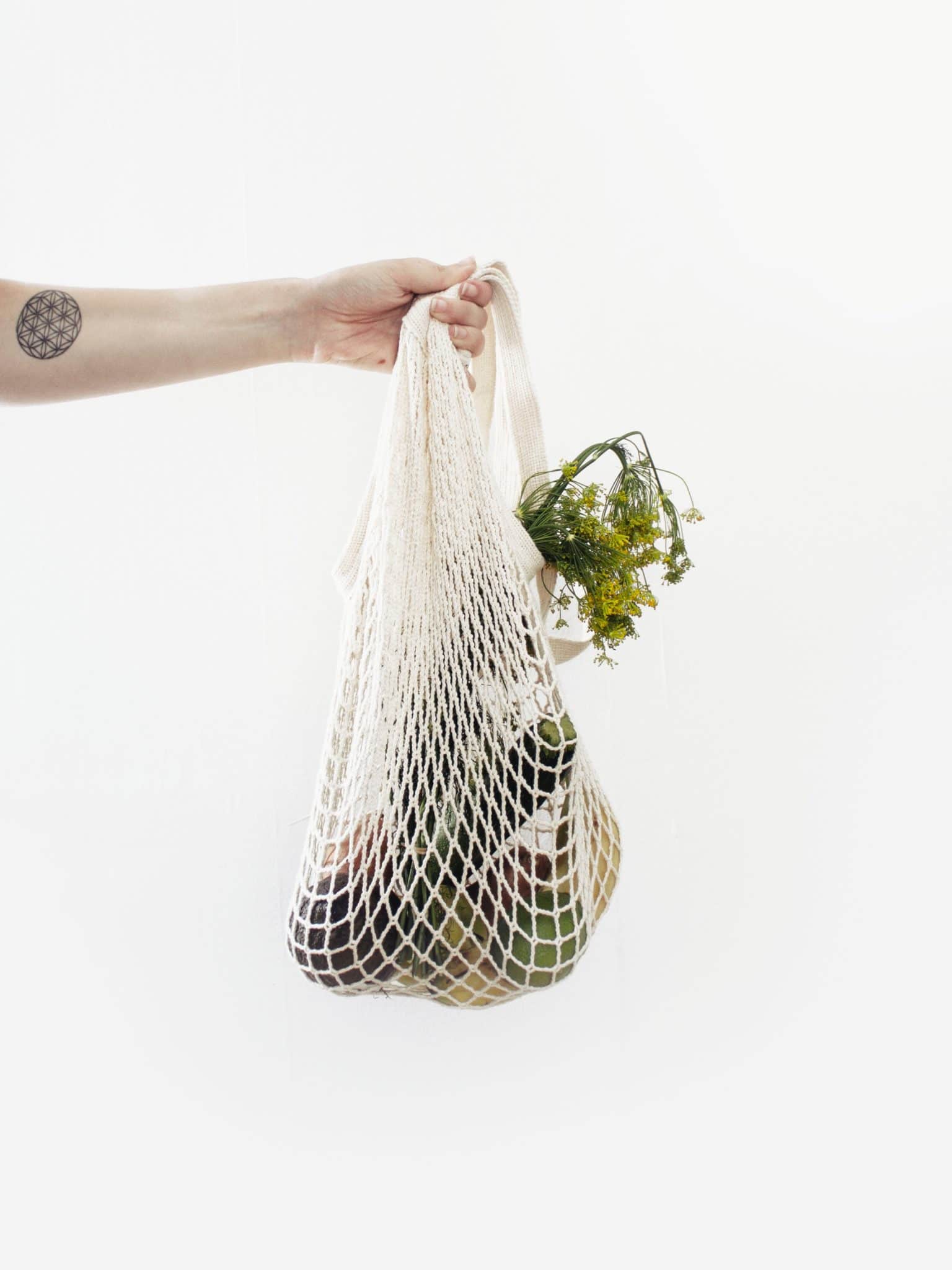

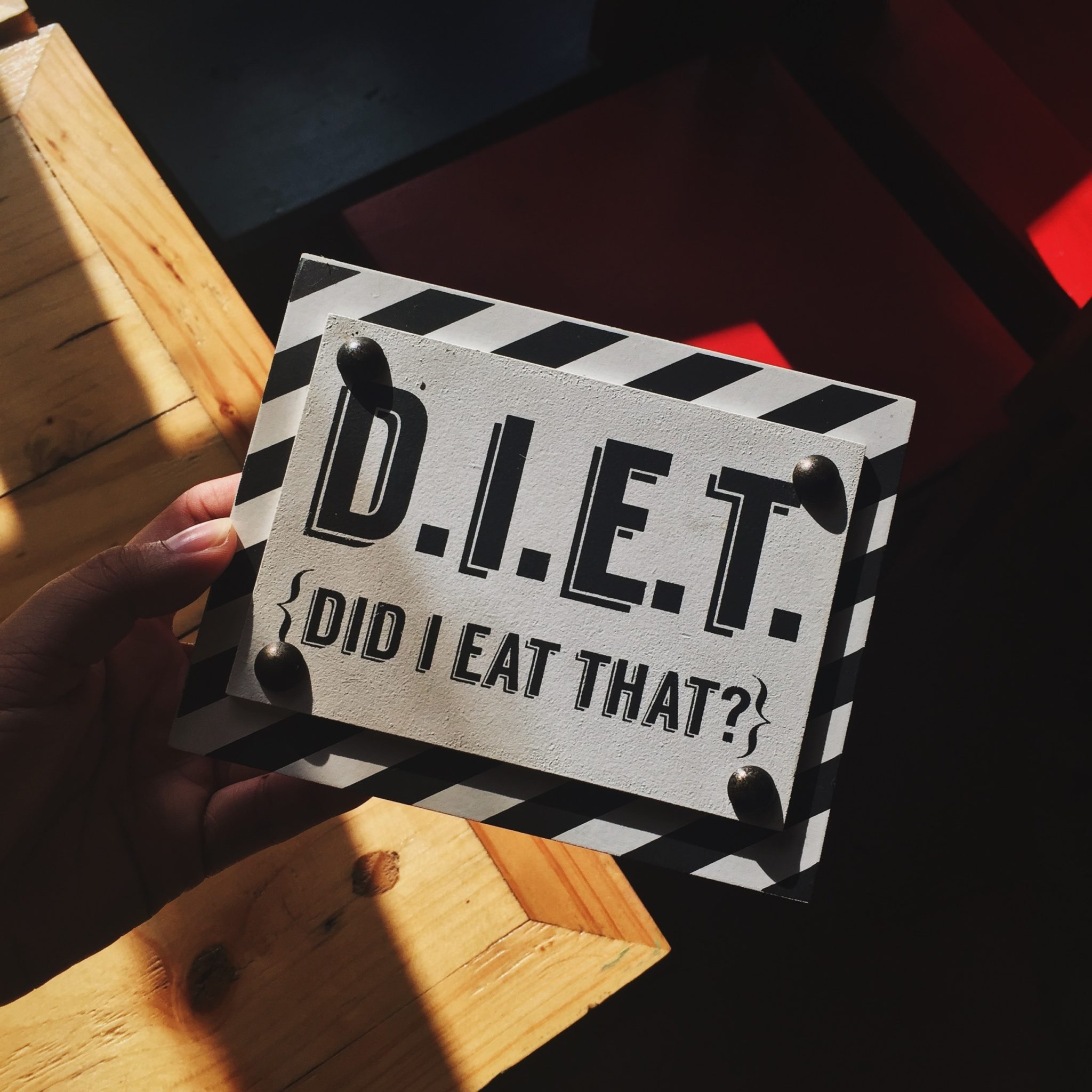
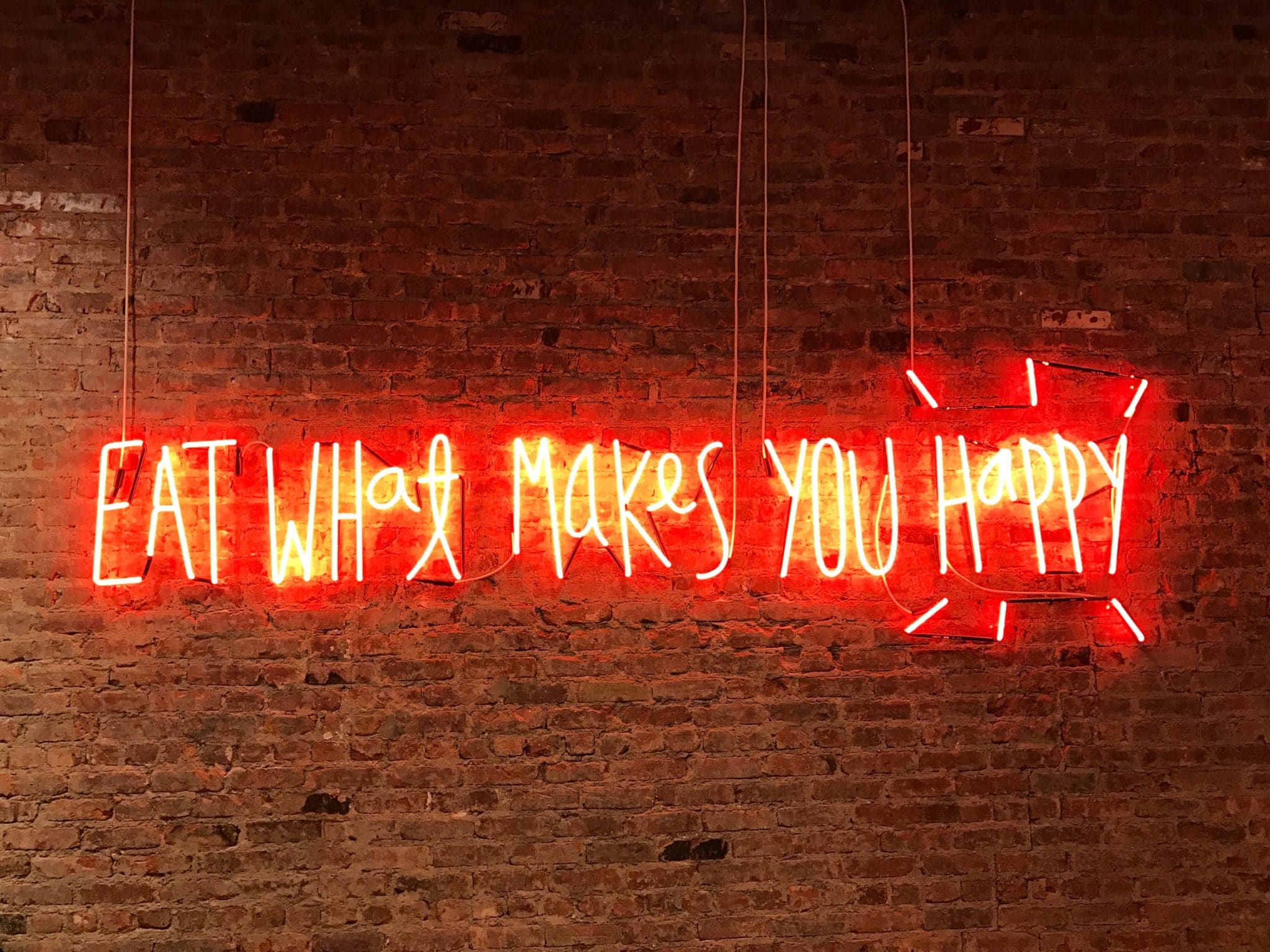
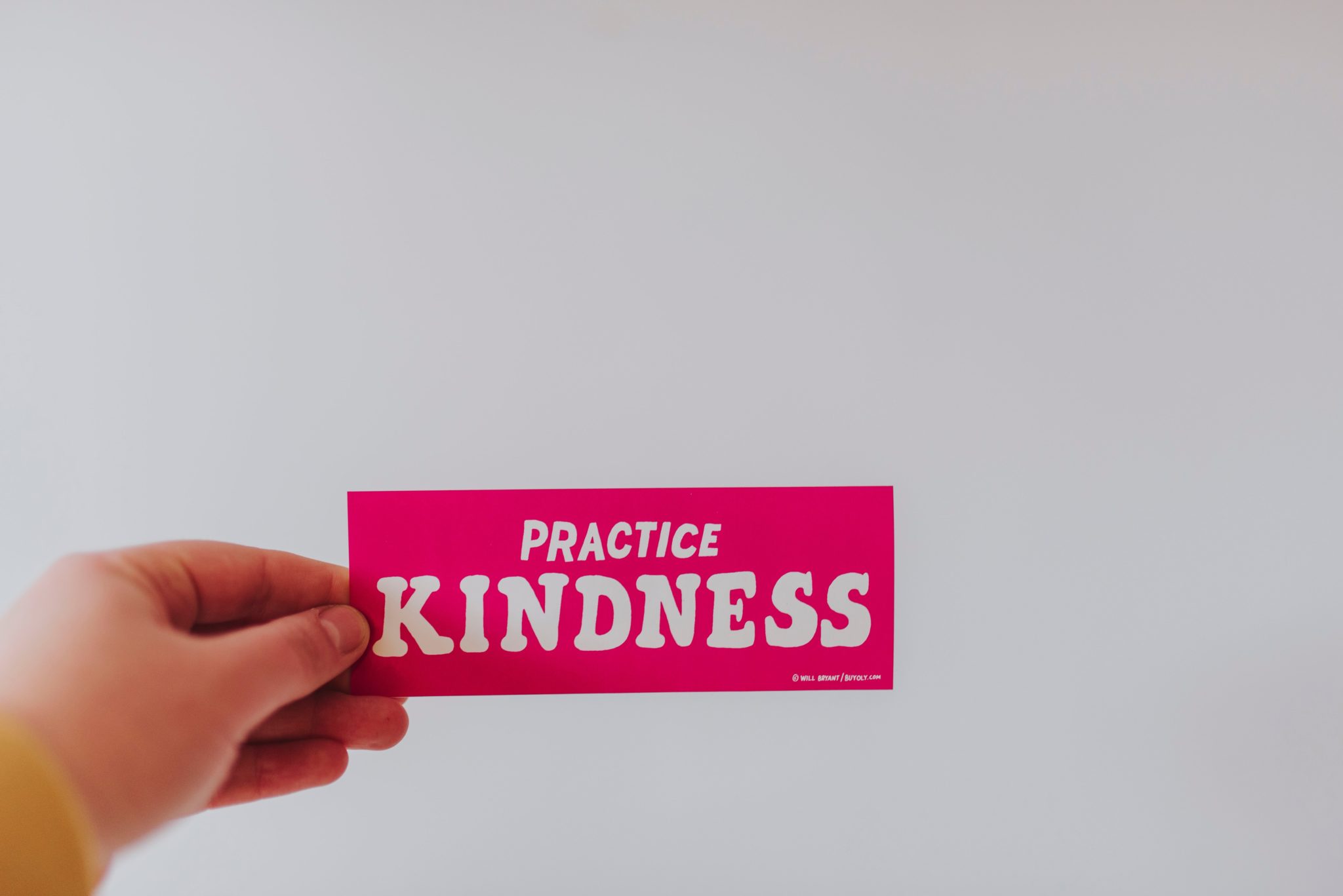


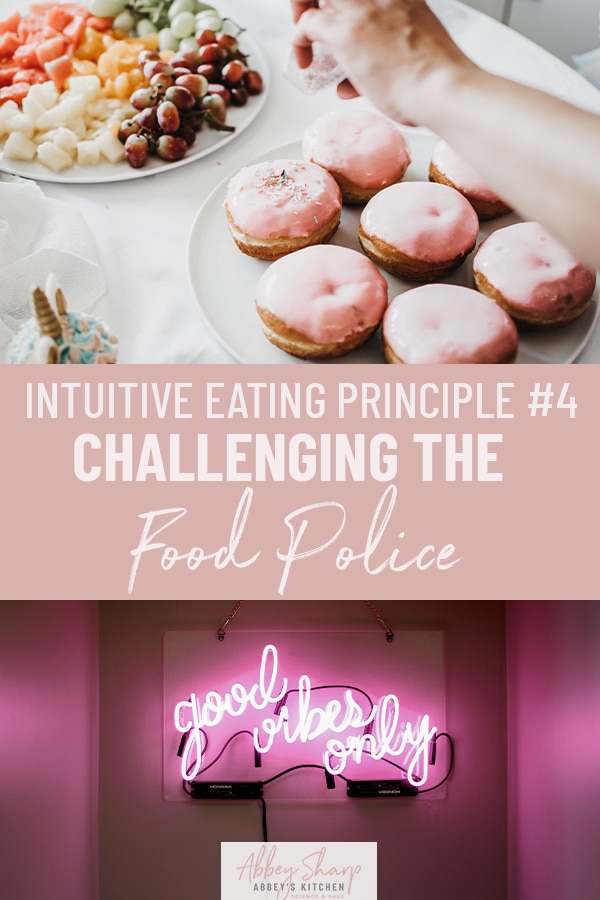

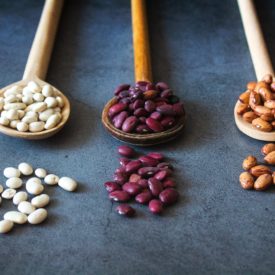
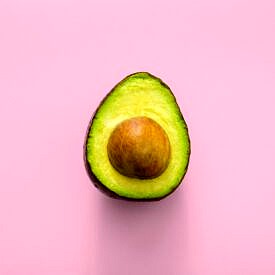

Ellen says
Abbey, my daughter has embraced Intuitive Eating through an online counsellor as she has struggled with anxiety, depression and food issues. She says that it has helped her with her self recriminations and body acceptance which is good. I do have concerns which I have not communicated to her that it seems that she has just become more comfortable with her poor eating habits and choices and that her health and weight issues are not being addressed by IE. She has told me that IE really is not about losing weight but about acceptance and I never engage with her about her weight as I know this is a journey only she can make. Is this something that is a process and she may eventually come to terms with making the changes she needs to make or is this just a way for her to continue with her poor habits? I would love to hear your opinion on this. Thank you.
Abbey Sharp says
its absolutely not about continuing poor habits. I think she deserves a lot of credit for taking on this journey! IE does actually address nutrition and healthy eating. I suggest getting the book – you can see some of my recommended IE books here (affiliate link) https://www.amazon.ca/shop/abbeysharp?listId=3GYHLHLW2BB62&ref=idea_share_inf